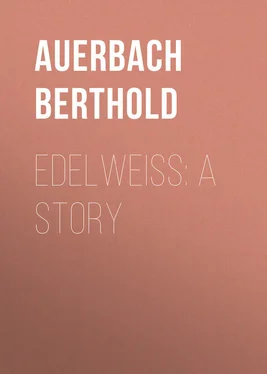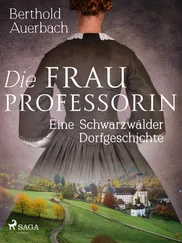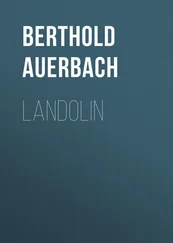Berthold Auerbach - Edelweiss - A Story
Здесь есть возможность читать онлайн «Berthold Auerbach - Edelweiss - A Story» — ознакомительный отрывок электронной книги совершенно бесплатно, а после прочтения отрывка купить полную версию. В некоторых случаях можно слушать аудио, скачать через торрент в формате fb2 и присутствует краткое содержание. Жанр: foreign_antique, foreign_prose, на английском языке. Описание произведения, (предисловие) а так же отзывы посетителей доступны на портале библиотеки ЛибКат.
- Название:Edelweiss: A Story
- Автор:
- Жанр:
- Год:неизвестен
- ISBN:нет данных
- Рейтинг книги:5 / 5. Голосов: 1
-
Избранное:Добавить в избранное
- Отзывы:
-
Ваша оценка:
- 100
- 1
- 2
- 3
- 4
- 5
Edelweiss: A Story: краткое содержание, описание и аннотация
Предлагаем к чтению аннотацию, описание, краткое содержание или предисловие (зависит от того, что написал сам автор книги «Edelweiss: A Story»). Если вы не нашли необходимую информацию о книге — напишите в комментариях, мы постараемся отыскать её.
Edelweiss: A Story — читать онлайн ознакомительный отрывок
Ниже представлен текст книги, разбитый по страницам. Система сохранения места последней прочитанной страницы, позволяет с удобством читать онлайн бесплатно книгу «Edelweiss: A Story», без необходимости каждый раз заново искать на чём Вы остановились. Поставьте закладку, и сможете в любой момент перейти на страницу, на которой закончили чтение.
Интервал:
Закладка:
"And we?"
"He whose pleasure lies in things that cannot be had for gold needs no money. All the superfluous chink that I have is my guitar, and it is all I want. I heard Don Bastian's youngest boy saying the Ten Commandments one day, and a bright thought came into my head. What is the first commandment? 'I am the Lord thy God: thou shalt have no other gods beside me.' Every man, then, can have but one God. You and I take pleasure in our art. You are happy when you have accomplished a work that harmonizes in all its parts, and so am I, though I do complain sometimes of the everlasting village with the same old mower and the eternal mother and child. But I am glad when it is done; and even while I am doing it I am as gay as a bird, – as gay as the finch there on the church-roof. Now a man that delights in his work, and puts his whole heart and soul into it, cannot be always thinking how he can make money, how he can speculate and cheat. And if he has a joy that money cannot buy, what does he want of money? I am satisfied with the sight of a beautiful group of trees, – with watching the sunbeams flicker in and out among the branches, and play bo-peep with one another so happy and loving. What should I gain by having the forest my own? 'Thou shalt have no other gods beside me.' That is a good saying. A second god is pretty sure to be the devil, as you may see by your Uncle Petrovitsch. The apostle says the same thing: 'Ye cannot drink the cup of the Lord and the cup of devils.'"
"Come and live with me," was Lenz's only answer. "I will have our upper room fitted up for you, and give you a chamber besides."
"Thank you, but that would be a mistake for both of us. Lenz, you are one of a thousand. You were cut out for a husband and father; you must marry. I imagine already the pleasure I shall take in telling your children stories about my travels. When I am too old to work, you shall give me a home with you, and kill me with kindness, if you will. But now keep your eyes open. Don't seem too fond of me. I not only will not be offended, but I advise you to put me in the background, that you may have a chance of a place in your uncle's will. We should make capital heirs. I have a real talent for inheriting; but unhappily my relatives are all poor devils, rich in nothing but children. I am the only one in the family that will have anything to leave, and I shall play the rich uncle one of these days, like Petrovitsch."
As a passing shower, which began to fall while the friends were talking, put a fresh brightness on the face of nature, so did Lenz's heart grow lighter under Pilgrim's influence. They waited till the rain was over, and then set out together for the hotel; but did not enter at the same time, as Pilgrim was unwilling to be seen by Petrovitsch in Lenz's company. A wagon stood before the door, and a young man was taking leave of the landlord, who accompanied him a few steps, and offered him his two fingers, pushing his little cap on the back of his head as he did so. After a parting salutation to the landlady and her daughter, the stranger ordered the coachman to drive on, and wait for him at the doctor's.
He raised his cap in greeting to the two friends as he passed them.
"Do you know him?" asked Pilgrim.
"No."
"Nor I either," said Pilgrim. "That is odd! Who is the stranger?" he asked of the landlord.
"The brother of my son-in-law."
"Oho!" whispered Pilgrim in Lenz's ear; "now I remember; some one told me he was a suitor of Annele's."
He did not see the change these words wrought in his friend's countenance; for Lenz turned hastily away and ran up the steps before him.
CHAPTER X.
LENZ DINES WITH PETROVITSCH, AND IS KEPT WAITING FOR THE SWEETS
Petrovitsch had not yet come. As Lenz sat at his table waiting for him, Pilgrim and he fell into conversation with the hosts. Annele was strangely reserved to-day. She would not even shake hands with Lenz when he entered, but pretended to be busy with some household work. Her hand is promised, he thought; she can give it to no one now, even in greeting. At last his uncle arrived, or rather his forerunner in the shape of a mongrel cur, half terrier and half rat-catcher.
"Good day, Lenz!" said the surly voice of Petrovitsch, who followed behind the dog. "I expected you yesterday. Did you forget I had invited you?"
"I confess I did entirely."
"I will excuse you under the circumstances; but generally a business man ought not to forget. I never forgot even a pocket-handkerchief in my whole life, and never lost so much as a pin. A man should always keep his seven senses about him. Now let us have dinner."
Annele brought the soup. The uncle helped himself, put some into another plate, and told Lenz he might have what was left. Then he drew from his pocket the paper, which he took daily from the post, cut it open while his soup was cooling, laid his tobacco-pouch and meerschaum upon it, and finally began his dinner.
"This is the way I like to live," said he, when the soup was removed and he was crumbing bread into the plate for the unknown guest, – "take my meals in a public house where I can have fresh table linen every day, throw down my score when I am done, and remain my own master."
When the meat was brought on, Petrovitsch, with his own hand, put a slice on Lenz's plate, took another himself, and cut again for the third plate. It must be meant for some very intimate friend, for the old man put his finger into it, after sprinkling some water over, and stirred up the food. At last the mystery was explained by his calling to his dog: "Come, Bubby, come; gently, gently, not so rough, Bubby; quiet, quiet!" He set the plate on the floor, and the dog attacked the dinner with a relish, licking his chops when it was over, and looking up gratefully and contentedly in his master's face. For the rest of the meal Bubby, as the dog was called, to the disgust of the villagers, got nothing thrown him but an occasional crumb. Petrovitsch said little during dinner. When he had finished, he lighted his pipe and took the paper, which Bubby understood as a sign that he might jump up into his master's lap. There he remained, half sitting and half standing, while Petrovitsch read the paper over the dog's head. Lenz found his position rather embarrassing. The old man's habits were too settled to be easily interrupted.
"Uncle," he said at last, "what made you spread the report that I was going abroad?"
Petrovitsch took three comfortable pulls at his cigar, blew out the smoke, stroked his dog, pushed him gently off his lap, folded the paper, restored it to his pocket, and finally answered: "Why, Lenz, what a queer fellow you are! You told me yourself you wanted to renew your youth by going out to see the world."
"I don't remember saying so."
"Very likely not; you hardly knew what you were talking about. But it would be a good plan if you did go away awhile; you would get out of many a rut. I have no desire and no right to force you."
Lenz was actually persuaded by his uncle's positive assertion that he had expressed such an intention, and apologized for having forgotten the circumstance.
"Draw your chair up closer, Lenz," whispered Petrovitsch, confidentially. "There's no need for the world to hear our conversation. Look here, if you take my advice, you won't marry."
"But, uncle, what makes you suppose I am thinking of marrying?"
"There is no telling what you young people won't do. Profit by my example, Lenz. I am one of the happiest men in the world. I have been enjoying myself for six weeks in Baden-Baden, and now everything seems pleasant to me here again. Wherever I go, I am my own master and command the best service. Besides, there are no girls nowadays who are good for anything. You would die of ennui with the simple and good-natured, while the bright and clever expect you three times a day, at every meal, to send off fireworks for their entertainment, besides boring you with continual complaints of 'this tiresome housekeeping that you men know nothing about.' Then there are the crying children, and the poor relations, and the school-bills, and the dowries."
Читать дальшеИнтервал:
Закладка:
Похожие книги на «Edelweiss: A Story»
Представляем Вашему вниманию похожие книги на «Edelweiss: A Story» списком для выбора. Мы отобрали схожую по названию и смыслу литературу в надежде предоставить читателям больше вариантов отыскать новые, интересные, ещё непрочитанные произведения.
Обсуждение, отзывы о книге «Edelweiss: A Story» и просто собственные мнения читателей. Оставьте ваши комментарии, напишите, что Вы думаете о произведении, его смысле или главных героях. Укажите что конкретно понравилось, а что нет, и почему Вы так считаете.












